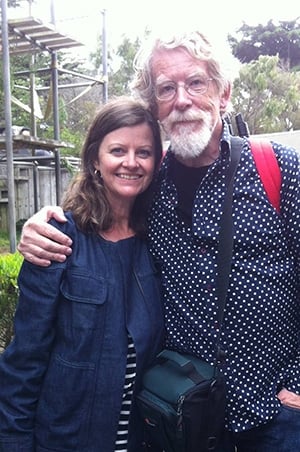Cobby the chimp: discovering the dark side of cute
Research news
Whether it was Tarzan’s mate Cheetah, Bonzo or Cobby, most people have fond memories of movie chimps from their childhood. However, what most of us don’t realise is that the chimps we see in movies are only babies - and many have gone on to have heartbreaking lives.
When she was an impressionable seven-year-old, Deakin researcher and independent filmmaker, Dr Donna McRae was a devoted fan of Cobby - the star of the American 1960s children's program, “Cobby's Hobbies,” who tried out a new hobby in each four-minute episode.
“He was endearing and cute - and annoying - because he made a mess at the end of each episode,” said Dr McRae.
Over forty years later, Dr McRae - who had always wondered what had happened to Cobby - found out, through an on-line forum, that he was still alive.
So began a journey that opened her eyes to the fate of chimps around the world and led to the production of a documentary called “Cobby: The Dark Side of Cute,” which highlights the plight of chimpanzees used by the entertainment world and their vulnerability in the wild, where their natural habitats are disappearing and extinction is a real threat.
"I discovered that ‘Cobby's Hobbies’ was filmed in Kansas around 1964 and that Cobby himself was still alive and well, at the age of 56, having been donated to the San Francisco Zoo in 1968," she said.
Dr McRae and co-director Dr Michael Vale, travelled across America and visited other parts of the world to produce their film and have just launched a Pozible fundraising campaign to fund its post-production.
The two are hoping to raise global awareness about the fate of chimps and put pressure on areas of exploitation, like advertising and the exotic pet trade.
The documentary follows the journey of Cobby from the African wild, to TV stardom, to the San Francisco Zoo, and includes interviews with Cobby’s keeper, Kathy Edwards, the zoo’s Curator of Chimpanzees, and Dr Stephen Ross, Head of the US Species Survival Plan for Chimpanzees and Director of the Lester E Fisher Centre for the Study and Conservation of Apes.
"In my search, I discovered that the chimpanzees we see in entertainment and advertising are, without exception, infants,” explained Dr McRae. “As a result, our impression of them is indelibly marked by their 'cuteness,' but, once the chimps grow older, their fate often becomes shrouded from public view."
“When they grow up, they become strong and dangerous and can’t be controlled. Baby chimps are still stolen from the wild for entertainment purposes. Sometimes their mothers are shot and used for the illegal bush meat trade, and the exotic pet trade is still booming in some parts of the world. A few former entertainment chimps in the US live in biomedical facilities and roadside zoos – and they are not given the quality of life they deserve.”
The crowdfunding campaign, “Cobby: The Dark Side of Cute” seeks to raise $11,000. It is one of four projects by Deakin researchers currently seeking funding as part of “Research My World,” an ongoing partnership between Pozible and Deakin.
Share this story
 Documentary makers - Dr Donna McRae and Dr Michael Vale.
Documentary makers - Dr Donna McRae and Dr Michael Vale.
